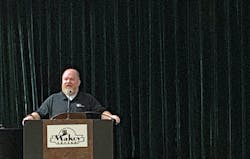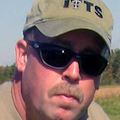Milestone: just celebrated 29 years with my current agency. That makes it 37 years in law enforcement. I celebrated by doing something I truly enjoy…training. Attended a two day L.E.V.A – Law Enforcement & Emergency Services Video Association course Video Evidence for Investigators a couple of weeks ago and a one day Unthinkable: Concepts and Techniques for the Gravest Extreme by Dr. William Aprill, PhD of Aprill Risk Consulting. I attended both of these courses on my own time and at my own expense.
One thing that has aided, motivated, informed and otherwise kept my butt safe during my law enforcement career is training. Though the agency has sent me to my share of training programs over the years, I’ve spent considerable amount of my cash and personal time to get the training I thought I needed. From hands-on suspect control to firearms courses, use-of-force legal programs to the four digital video evidence courses I’ve attended over the last two years trying to gain expertise about this new and emerging technology as applied to officer involved shooting and force investigations. This digital video evidence training has aided me in ascertaining totality of the circumstances and examining suspect’s deadly threat towards officers or others as caught on video. Fact is that if we, law enforcement, don’t analyze and examine video evidence and become more technologically adept, defense and plaintiff attorneys will…and have. I’m aware of multiple cases where digital video evidence was used by the other side against individual officers and agencies while the cops, prosecutors and police defense attorneys were ill prepared to use those same BWC, IVS, cellphone and surveillance videos and images. There is excellent training out there to fill that void and in my role as an instructor, investigator and expert, I aim to educate and improve my knowledge base to better train, investigate and defend the cops I’ve sworn to protect.
Training Programs
You see, from a better mindset and tactics for survival on the streets, to classroom programs on the legal aspects of use of force there are solid schools and classes out there for you. Getting a little stale and burned out? Want to improve your shooting? Have a gang problem in your city that you want to make a difference with? Want to seek out an expertise you’re interested in pursuing? You can do all that through training, I know, I’ve been motivated by all those things and more to attend training.
Take Dr. William Aprill’s Unthinkable course I attended just yesterday. I first met and attended Dr. Aprill’s program at Tom Given’s excellent Rangemaster Conference I taught at for the last two years. Though my exposure to his material was limited by travel arrangements, I followed up by listening to several interviews he’s done on podcasts. I told myself, and Dr. Aprill, that I’d make plans to attend a course. So, when Buckeye Firearms Association brought in the good doctor for a low cost seminar, I signed up immediately. Dr. Aprill is a former LEO from New Orleans (sheriff’s deputy and U.S. Marshall) who is currently a practicing psychologist with extensive experience in dealing with VCA’s – Violent Criminal Actors, their psychology, motivations and methods. Aprill’s examination into VCA’s assaults and killings of citizens uses F.B.I. Officers Killed and Assaulted research to examine victim officers and how they interacted with criminal actors. The F.B.I. has published multiple studies (linked here in an excellent piece on police academy training by Dr. Bill Lewinski of Force Training) the authors, Pinizzotto, Davis, and Miller of these studies went on to pen The Deadly Mix: Officers, Offenders, and the Circumstances that Bring Them Together .
Dr. Aprill correctly cites these F.B.I. studies and common trends of victim officers:
· Hardworking – in this context it means, “…potentially serious administrative and safety issues can arise with hardworking officers. Some may take unnecessary safety and procedural shortcuts to increase their levels of production.”
· Tended to use less force
· Used force as a last resort
· Look for the good in people
· Public relations and service oriented
· Laid back and easy going
But the good doctor adds his own traits of victim officers to the list:
· Viewed violence (force) as an abstraction
· Refusal to “front load” applications of force (making the decision when force will be used and becoming skilled in the application)
· Attribution of their “interior states” to others, i.e. “I’m a good guy, he looks like a good guy”
· Lack of healthy disrespect – fail to anticipate the possibility of violence from others
· Unwillingness to maintain some reactionary advantage – keeping a safer distance when possible
· Persistent initiative deficit – lag time in getting your game on based on suspect’s actions
· Poor chaos management – inability to respond to violence effectively
V.C.A.’s
William Aprill gave us a list of “go signals” that Violent Criminal Actors look for in victims. Though this is not “pre-attack postures” or the like these areas can be diminished and trained away based on acknowledgement and work by officers and citizens alike. They are:
· “Babyfacedness” – we all know that VCA’s and criminals in general can sense, perceive and smell a rookie and his or her indecision and potentially use it against them.
· “Dithering/confusion/distractibility/multitasking” – by knowing the law, training to be decisive and limiting distractions and multitasking, an officer can increase a VCA’s perception of opportunity
· “Trust” – I’ve seen far too many officers trust a suspect to not resist versus deny them opportunity by controlling them
· “Perceived laziness” – whether laziness in pat-downs, handcuffing, searches or other suspect control, VCA’s are looking for a “go signal” and see one in lazy officers
· “Perceived competence/professionalism” – you’ve read multiple times in my articles that competence breeds confidence, and this is being gauged by VCA’s on the street
· “Attention to detail” – “sloppy searches kill cops” is a mantra I’ve had my trainees yell out when doing pushups after they’ve missed prop weapons and contraband in basic training
· “Authentic authoritative posture” – is your body posture telling the VCA an attack is a “go” or a “no go”
· “Projecting presence” – developing “the look” which simply means that you will not tolerate resistance and will respond aggressively to attack
Dr. Aprill correctly comments that VCA’s are looking for easy targets (whether police or private citizen) and their attacks will be in the form of ambush. As an example, he told the story of the strong-arm robber who would eat a bag of pretzel bites outside an upscale mall with his head down looking at shoes. His targets of choice wore Velcro shoes, indicating age and infirmity. He would follow his target to their car, attack when they were in a restricted space between vehicles, punch them in the head, knocking them to the ground, whereupon he would rob them. By the time someone found the prostrate victim lying on the ground, he was long gone and his victims had scant memory for what had happened or his description.
This story illustrates the thought process of a professional VCA. Far from being shy about violence, he thought about it, planned and prepared and swiftly and employed it to get what he wanted. It was his business.
Wrap Up
If police work is your business, then training to prepare to deal with VCA’s as well as other criminals is the way to “make it home safely” at the end of your shift. In this, Dr. Aprill’s training is highly recommended! You simply cannot count on your agency to train you to the level you need.
Me? Well, plans are to attend the ILEETA – International Law Enforcement Educators and Trainers Association conference next month in St. Louis, as well as finally making it to a Force Science Analyst training program this year. For me, my lessons learned have come from a course or seminar directly to the streets or my student/officers, and these lessons have oftentimes come at the price of blood shed by my Brothers and Sisters in Blue. It would be a shame to let their price paid to be for naught. Go get your learning on now!
About the Author
Kevin Davis
Tactical Survival Contributor
Kevin R. Davis retired from the Akron Police Department after 31 years with a total of 39 years in law enforcement. Kevin was a street patrol officer, narcotics detective, full-time use of force, suspect control, and firearms instructor, and detective assigned to the Body Worn Camera Unit. Kevin is the author of Use of Force Investigations: A Manual for Law Enforcement, and is an active consultant and expert witness on use of force incidents. Kevin's website is https://kd-forcetraining.com/

